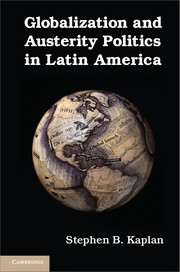Book contents
- Frontmatter
- Contents
- List of Figures
- List of Tables
- Acknowledgments
- 1 Introduction
- 2 Globalization and Austerity Politics
- 3 The Political Economy of Elections
- 4 The Electoral Boom-Bust Cycle
- 5 From Gunboat to Trading-Floor Diplomacy
- 6 When Latin American Grasshoppers Become Ants
- 7 The Political Austerity Cycle
- 8 Conclusion
- Appendix: Field Research Interviews
- Bibliography
- Index
- Other Books in the Series (continued from page iii)
2 - Globalization and Austerity Politics
Published online by Cambridge University Press: 05 February 2013
- Frontmatter
- Contents
- List of Figures
- List of Tables
- Acknowledgments
- 1 Introduction
- 2 Globalization and Austerity Politics
- 3 The Political Economy of Elections
- 4 The Electoral Boom-Bust Cycle
- 5 From Gunboat to Trading-Floor Diplomacy
- 6 When Latin American Grasshoppers Become Ants
- 7 The Political Austerity Cycle
- 8 Conclusion
- Appendix: Field Research Interviews
- Bibliography
- Index
- Other Books in the Series (continued from page iii)
Summary
The United States aggressively responded to the 2008–2009 global financial crisis with a flurry of economic stimulus. For the champion of laissez-faire economics, crisis-induced budget spending and interest rate cuts were an about face from its austerity doctrine exported across the globe. Throughout the post- Cold War era, the U.S. Treasury and International Monetary Fund have tied economic aid to restrictive spending and credit policies. From Latin America to East Asia, the United States has advocated for economic stabilization policies in the face of financial crises. Surprisingly, developing country leaders often have doggedly embraced these free-market principles. Many of these countries are young democracies characterized by fervent popular pressures for growth, redistribution, and jobs, yet their politicians pursue conservative non-interventionist policies. In hard times, the political benefits of a short-term soporific should outweigh the long-term self-healing powers of laissez-faire capitalism. What's the political payoff to being a cautious steward of the economy?
The appeal of non-interventionist economic policies is even more surprising when chief executives are battling for their political survival. Political economy scholars expect politicians to swell the public purse to gain votes, particularly in newly democratized regions that are plagued by chronic unemployment and high poverty. Some politicians abide by this policy making logic, known as the political business cycle. According to this logic, politicians are consumed with winning the vote. They create a short-term economic boom designed to curry favor with the electorate that often ends in an inflation-induced economic bust.
- Type
- Chapter
- Information
- Globalization and Austerity Politics in Latin America , pp. 25 - 71Publisher: Cambridge University PressPrint publication year: 2013
- 8
- Cited by



